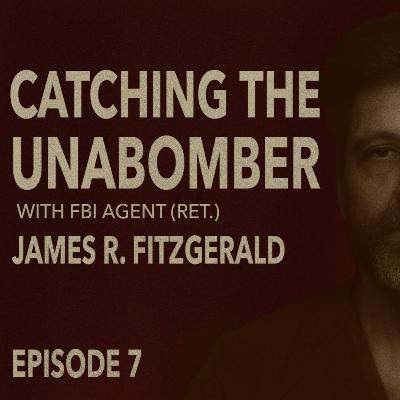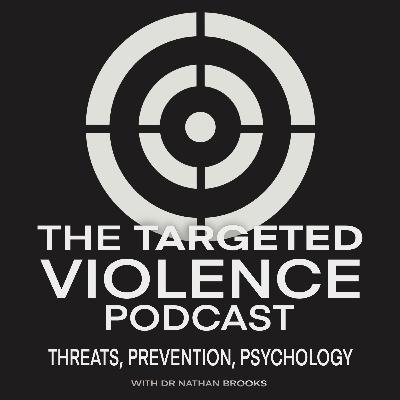Discover The Targeted Violence Podcast
The Targeted Violence Podcast

The Targeted Violence Podcast
Author: The Targeted Violence Podcast
Subscribed: 10Played: 30Subscribe
Share
© The Targeted Violence Podcast
Description
The Targeted Violence Podcast explores the psychology, motivations, and behaviours behind acts of targeted violence. Hosted by Forensic Psychologist Dr Nathan Brooks, this podcast brings together experts from law enforcement, forensic psychiatry, psychology, and threat assessment to share their firsthand experiences investigating and assessing perpetrators of mass violence, lone actor attacks, stalking, and other targeted offences. Through in-depth discussions and real case analyses, the podcast provides insights into the minds of those who commit these acts.
7 Episodes
Reverse
In this episode of The Targeted Violence Podcast, retired FBI Supervisory Special Agent James R. Fitzgerald joins the show to revisit one of the most notorious cases in U.S. history—the hunt for the Unabomber, Theodore Kaczynski.James shares how he was thrown into the deep end of the investigation in 1995, after it had already spanned more than 15 years. We dive into his groundbreaking work in forensic linguistics, particularly his analysis of the Unabomber manifesto, which became one of the critical pieces of evidence that helped bring the case to a close.We also discuss James’s pivotal decision to advocate for publishing the manifesto in The Washington Post—a move that faced pushback at the time but ultimately proved vital. Remarkably, September 2025 marks the 30th anniversary of that publication.During the discussion, James reflects on the role of manifestos in today’s landscape of targeted and extremist violence, and how Kaczynski’s writings continue to influence attackers decades later.This was a fascinating conversation about high-stakes decision-making, the pressure of major investigations, and the enduring implications of the Unabomber case.
In this episode of The Targeted Violence Podcast, we speak with Dr Lisa Warren, Director of Code Black Psychology, to talk about a topic that’s often misunderstood and too frequently dismissed: Stalking. Together, we explore:🔹 Why stalking must be taken seriously🔹 The importance of viewing it through both victim and offender lenses🔹 How multi-agency responses are essential to effective interventionWe also give a sneak peek into the Stalking Symposium, which Lisa and I are proud to be jointly co-hosting. This upcoming event will bring together experts to shine a light on best practices, risk assessment, and prevention efforts in stalking cases.🎧 Tune in to the episode for insight, experience, and a preview of what’s ahead at the symposium. To learn more about the Stalking Symposium, please visit https://www.drnathanbrooks.com/event-info/stalking-symposium-melbourne.
In the latest episode of the Targeted Violence Podcast, we speak with Retired Detective Paul Mitton from the Durham Regional Police Service, Ontario, Canada.In a shift from our usual focus on targeted violence, this episode explores the world of serial offending. Det. Mitton shares his experience interviewing serial killer Adam Strong, who murdered two young women roughly a decade apart. The case came to light when plumbers discovered human flesh in the drains of Strong’s rental property—triggering a complex police investigation.Det. Mitton’s 12-hour interview with Strong played a pivotal role in securing a conviction and was highly praised by the sentencing judge. In this episode, we unpack:The importance of rapport and reciprocityThe value of preparation and planningHow to interview challenging personalitiesThe subtle cues and turning points that led to Strong’s admissionsTo learn more about Det. Paul Mitton and his ongoing work in suspect interview training, visit Eastwood Consulting, where he is partnered with Joseph Eastwood.
In this episode of The Targeted Violence Podcast, Detective Sergeant David Thomason of Cheshire Police joins us to discuss the pioneering work of the Harm Reduction Unit—a specialist team focused on identifying and addressing stalking and other harmful behaviours. Through a proactive, multi-agency approach, the unit is reshaping how serious cases of stalking are understood, assessed, and managed.David shares insight into the development of the unit, the challenges of policing stalking, and the critical role of risk and threat assessment. We explore strategies for supporting victims, the motivations and patterns behind stalking behaviour, and the systemic gaps that often hinder effective intervention. David also reflects on the tragic stalking-related homicide of Clare Munro, a case that continues to drive his commitment to prevention and harm reduction.
In this episode of The Targeted Violence Podcast, we sit down with Professor Charles Scott, a leading Forensic Psychiatrist who conducted the psychological assessment of Nikolas Cruz, the perpetrator of the Parkland school shooting. Professor Scott offers a rare and in-depth look into Cruz's mind—exploring his planning, violent fantasies, personality traits, and craving for notoriety.This is a must-view for threat assessment and management professionals. The episode unpacks the warning behaviours, interview strategies, and the systemic failures that preceded one of the deadliest school shootings. Professor Scott shares clinical insights and critical lessons for preventing future acts of mass violence.
In this episode of The Targeted Violence Podcast, we speak with esteemed Forensic Psychiatrist Dr. William Reid, who assessed Aurora, Colorado mass shooter James Holmes. Dr. Reid provides a rare insight into Holmes’ psychology, his motivations, and the complexities of forensic mental health assessments in high-profile cases. We explore what drives individuals to commit such horrific acts and what we can learn from these tragedies to prevent future violence.
Welcome to the Targeted Violence Podcast. On April 23rd 2018, a 25 year old male drove a rented van through a crowded street in downtown Toronto. In the immediate aftermath of the event, Detective Rob Thomas from the Toronto Police Service was tasked with interviewing the perpetrator and learning about his motivations for the attack and his identification with the Incel ideology.






